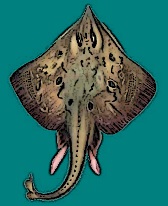Secret life of shy skates investigated in world-first study
News Release
University of Tasmania, Australia
26. August 2013
———————–
 The first major study into the elusive Maugean skate is being undertaken by the University of Tasmania’s Institute for Marine and Antarctic Studies (IMAS)
The first major study into the elusive Maugean skate is being undertaken by the University of Tasmania’s Institute for Marine and Antarctic Studies (IMAS)
The Maugean skate is known from only two localities, Macquarie Harbour and Bathurst Harbour in western Tasmania and because of this limited range the species is listed as endangered.
The research will focus on Macquarie Harbour and will use acoustic tracking technology to examine skate movement patterns and habitat utilisation. In addition, non-destructive techniques will be used to examine its reproductive biology and feeding behaviour.
Up to 40 skates will tagged with acoustic tags that will enable them to be tracked over a 12 month period.
Additional individuals will be tagged with microchips, similar to those used for cats and dogs, and based on recapture rates it is hoped that population size can be estimated.
Project leader, Dr Jeremy Lyle, said the Maugean skate was first recorded scientifically in 1988 and is believed to be unique among skates in that it is only found in brackish water.
“Very little is known about its biology, habitat utilisation, population size and ecological requirements.”
In the formal listing of the species as endangered, the main potential threats to the Maugean skate in Macquarie Harbour were identified as the incidental capture by recreational and commercial fishing activities (in particular in gillnets), the introduction of non-native marine species and an increase in tourism pressure.
Professor Colin Buxton, Director of Fisheries, Aquaculture and Coasts at IMAS and project co-investigator, said that the project has been developed collaboratively with the salmon industry to identify and act to minimise any impacts that may be linked to this unique species.
“This study will also help better understand the level of risk posed by human activities on the Maugean skate population,” Prof Buxton said.
“Knowledge of how the species utilises the harbour, for instance depth preferences and seasonal distribution patterns, will help develop strategies to minimise interactions between fishing gear and the skates.”
“The study will also contribute significantly to our understanding of the nature of interactions with existing and proposed marine farming operations” Prof Buxton said.
The project is supported by approximately $264,000 funding from the Australian Government through the Fisheries Research and Development Corporation.
Source: UTAS
